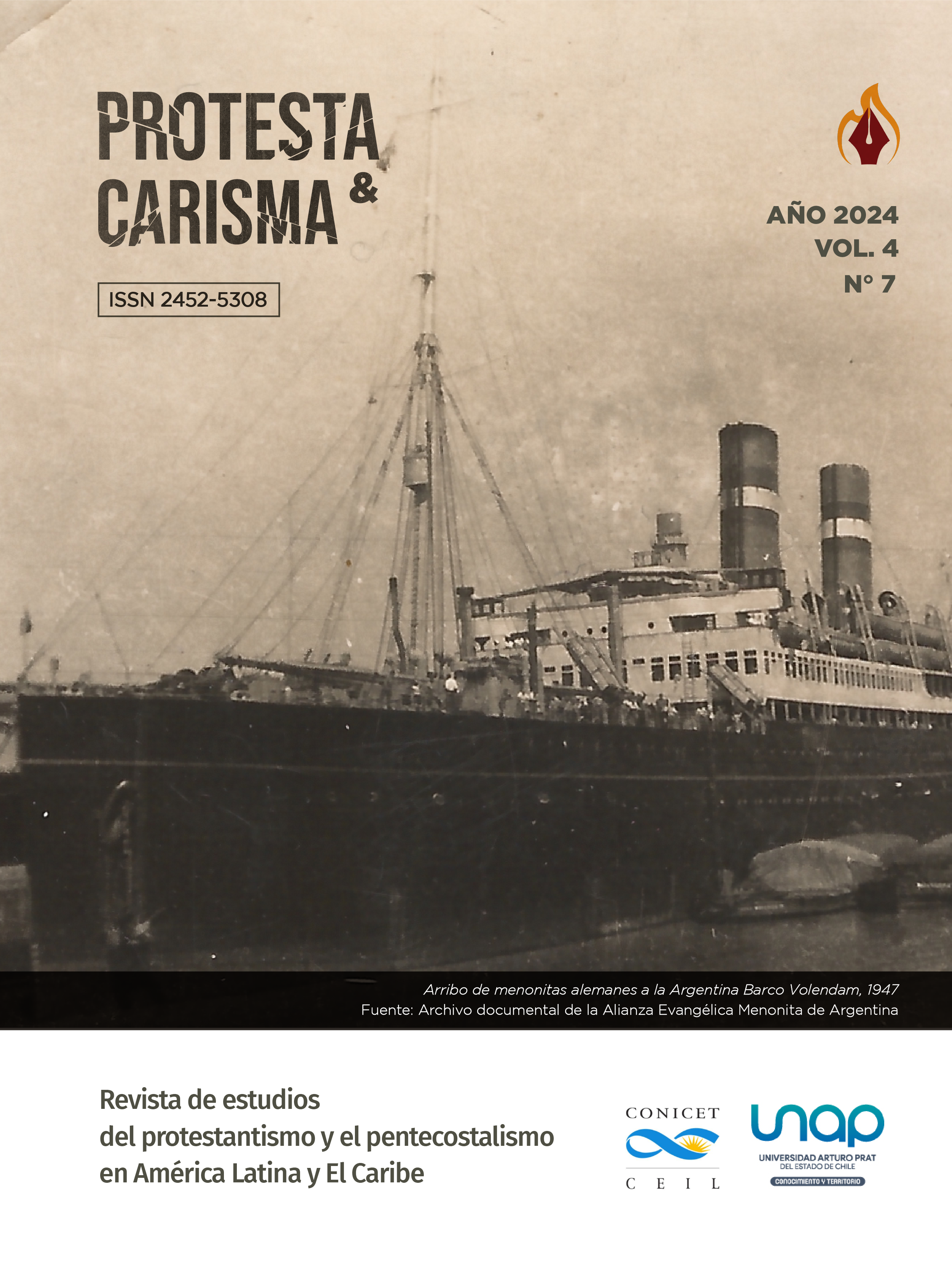Committed and Radical Hermeneutics
Hugo Zorrilla's contribution to the Hermeneutics of Liberation
DOI:
https://doi.org/10.61303/24525308.v4i7.96Keywords:
Hermeneutics, Release, Liberating perspective, Protestantism, Mennonite-Anabaptist, Hugo ZorrillaAbstract
The emergence of Liberation Theology (LT) in Latin America and the Caribbean (LAC) is recognized within the context of the Catholic Church, however, today the contribution of theologians and biblical scholars from the Protestant tradition who They joined the approaches that emerged within it from different perspectives and thus recognized its ecumenical character. On the other hand, the TL contributed not only to the construction of a transformative discourse in Theology and society, but also demanded different approaches to the biblical text that responded to said transformation and to that of a renewed Christian praxis. Hand in hand with theological production, different efforts arose from a liberationist perspective reading of the Bible rooted in the dynamics of the base ecclesial communities and efforts, of a more academic nature, that reflected an approach to the text that was more connected to our realities. and in discussion with the exegetical assumptions of the most North Atlantic tradition. Within this contribution and from the Protestant-Anabaptist tradition we have that of Hugo Zorrilla, Colombian and biblical scholar, and whose contribution we can describe as a committed hermeneutics, “obedient” in his own words, and radical that adds to the other proposals that emerged in the Latin American context.
Downloads
References
Alvarez-Verdes, L. (1989). El método sociológico en la investigación bíblica actual. Studia Moralia, 27(1), 5-41.
Anderson, A. F., & Gorgulho, G. (1984). La lectura sociológica de la Biblia. Estudos Biblicos(2), 6-10.
Boff, C. (1992). Epistemología y método de la Teología de la Liberación. En I. E. (eds.), Mysterium Liberationis. Tomo I. (págs. 79-113). San Salvador: UCA.
Boff, C. (2001). Teoria del Método Teológico. México: Dabar.
Compton, R. (1984). La Teología de la Liberación, una guía introductoria. El Paso: Casa Bautista de Publicaciones.
Croatto, J. S. (1998). Las nuevas hermenéuticas de la lectura bíblica. En R. A. (Coord.), Nuevas Hermenéuticas bíblicas (págs. 15-36). Managua: Lascasiana.
Croatto, S. (1973). Liberación y Libertad. Buenos Aires: Mundo NUevo.
Elliott, J. H. (2008). La crítica socio-científica: la configuración colectiva y cooperativa de un método. En C. B. (eds.), Reimaginando los orígenes del cristianismo (págs. 101-115). Navarra: Verbo Divino.
Escobar, S. (1987). La fe evangélica y las teologías de la liberación. El Paso: CBP.
Holmnerg, B. (1995). Historia social del Cristianismo primitivo. La sociología y el Nuevo Testamento. Madrid: El Almendro.
Huning, R. (2007). Aprendiendo de Carlos Mesters: Hacia una teoría de lectura bíblica.Navarra: Verbo Divino.
Kruger, R., Croatto, S., & Míguez, N. (2006). Método Exegéticos.Buenos Aires: ISEDET.
López, E. (2003). Para que comprendiesen las Escrituras: Introducción a los métodos exegéticos. San Juan : Seminario Evangélico de Puerto Rico.
Míguez, N. (2006). Lucas 1-2: una mirada económica, plítica y social. RIBLA(53), 44-51.
Nuñez, E. A. (1986). Teología de la Liberación. Una perspectiva evangélica. San José: Caribe.
Reyes, F. (1997). Hagamos vida la Palabra. Bogotá: CEDEBI.
Reyes, F. (1997). Hermenéutica y Exégesis. RIBLA(28), 9-36.
Rhoads, D. (1992). Social Criticism: crossing boundaries. En J. C. (ed.), Mark & method. New approaches in biblical studies (págs. 135-161). Minneapolis: Fortress press.
Tamayo, J. J. (2011). La Teología de la Liberación en el nuevo escenario político y religioso. Valencia: Tirnat lo blanch.
Zorrilla, H. (1981). La Fiesta de la Liberación de los oprimidos. relectura de Jn. 7.1-10.21. San José: SEBILA.
Zorrilla, H. (1987). Miqueas, portavoz del campesinado. Guatemala: SEMILLA.
Zorrilla, H. (1989). Estudiando y comprendiendo la Biblia. Guatemala: SEMILLA.
Zorrilla, H. (1993). El discípulo obediente: agente de la liberación (Juan 8:31-32). En D. S. (Ed.), Discipulado y Liberación (págs. 21-40). Bogotá: CLARA-SEMILLA.
Downloads
Published
Issue
Section
License
Copyright (c) 2024 Roberto Caicedo Narváez

This work is licensed under a Creative Commons Attribution-NonCommercial-ShareAlike 4.0 International License.
Authors who publish in this journal agree to the following terms:
- Authors retain copyright and grant the journal right of first publication with the work simultaneously licensed under a Creative Commons Attribution-NonCommercial-ShareAlike License 4.0 (CC BY-NC_SA 4.0) that indicates: a) It is allowed that others share the work, with an acknowledgement of the work's authorship and initial publication in this journal, b) The work may not be used for commercial purposes, c) If it's remixed, transformed, or built upon the material, one must distribute the contributions under the same license as the original
- Authors are able to enter into separate, additional contractual arrangements for the non-exclusive distribution of the journal's published version of the work (e.g., post it to an institutional repository, website or publish it in a book), with an acknowledgement of its initial publication in this journal.
- Authors are permitted and encouraged to post their work online (e.g., in institutional repositories or on their website) prior to and during the submission process, as it can lead to productive exchanges, as well as earlier and greater citation of published work.






